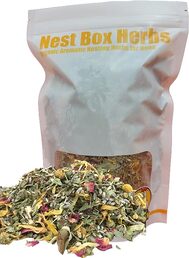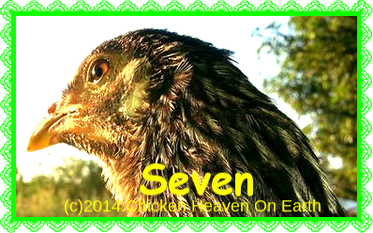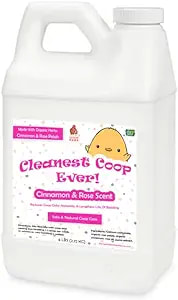Studies and list of herbs that can help improve chickens overall health and target various health problems for chickens, stimulate egg laying, can be used as antibiotics, repel insects, make nest boxes smell better, and a whole lot more. See which herbs do what for your chickens below.
Looking for more natural ways to take care of your chickens? This list of herbs and how they can improve your chickens health will give you a good head start on a more natural way to take care of your chickens. There are many types of herbs and greens you can grow that can help your chickens stay healthy and happy. Check out these natural remedies for various chicken illnesses, stimulate laying, antioxidants, rodent repellents, and more, that you can either buy or grow yourself!

My Favorite Chicken Poultry Nest Box Herbs - Certified Organic Aromatic Nesting Herbs for Hens. Contains: Organic Lemon Verbena, Organic Calendula, Organic Chamomile, Organic Echinacea, Organic Lavender, Organic Lemon Balm, Organic Spearmint, Organic Rose Buds/Petals. #nestboxherbsforchickens, #organicnestboxherbs, #commissionsearned
List of herbs which stimulate egg laying and relieve stress
 Her name is Seven-rescued Easter chick at Chicken Heaven On Earth
Her name is Seven-rescued Easter chick at Chicken Heaven On Earth
You can create a natural bedding, nesting area for your chickens that will make them healthier, relieve stress, stimulate laying, and make the coop smell good. You can also create herb gardens for your chickens to munch on these great egg laying stimulants.
Fennel
Grind it to a powder to mix with feed or sprinkle it in nesting boxes.
Garlic
Garlic is said to be a laying stimulant that can be used in various ways. Feeding raw or cooked garlic to your chickens is the best way to get the vitamins from it but will also impart this flavor into their eggs. Mincing, slicing, or juicing the garlic and using it as a spray in nest boxes will have the same effect, is also said to reduce blood pressure so it has a calming effect on chickens. Garlic bulbs sprout quickly and are easy to grow.
Lavender
Probably best known for relieving stress and used as an antiseptic or antibiotic, according to Medical News Today lavender has even been used to treat insomnia, anxiety, and depression. Lavender can be grown for your chickens to munch on, you can use dried lavender leaves and petals in their bedding and nests, or you can spray the nests and coops with lavender oil. Your hens will feel comfy and relaxed while laying their eggs plus it will make your chicken coop smell wonderful.
Lemon Balm
Great stress reliever, makes the coop smell great and rodents hate it. Lemon balm is best known to relieve stress and anxiety, reduce pain, improve appetite, as a colic prevention, sleep aid, and as an egg laying stimulant. You can rub lemon balm on your chickens feet, comb, and wattles too. Shredded dried lemon peels can be sprinkled in nests and bedding. Lemon fruit and pulp can be fed directly to your chickens as a feed supplement. Lemon balm can get pricey, so you may wish to grow your own lemon trees if you have a green house, grow miniature lemon trees indoors, or live in a warmer region where lemon trees naturally grow.
Marigolds (Calendula)
Best known for preventing skin dryness and chapping, reducing swelling and inflammation, and can be used as a natural antiseptic. Stimulates egg laying production.
Marjoram
Best known as an antioxidant, antiseptic, anti viral, antibacterial,and for enhancing cardiovascular and circulation. Used in nests and coops it imparts it's natural sweet aroma as well as reducing the chances for bacterial infections, and helps your chickens heart and blood circulation. It is also a natural laying stimulant.
Nasturtium
Laying stimulant, antiseptic, antibiotic, insecticide, wormer
Fennel
Grind it to a powder to mix with feed or sprinkle it in nesting boxes.
Garlic
Garlic is said to be a laying stimulant that can be used in various ways. Feeding raw or cooked garlic to your chickens is the best way to get the vitamins from it but will also impart this flavor into their eggs. Mincing, slicing, or juicing the garlic and using it as a spray in nest boxes will have the same effect, is also said to reduce blood pressure so it has a calming effect on chickens. Garlic bulbs sprout quickly and are easy to grow.
Lavender
Probably best known for relieving stress and used as an antiseptic or antibiotic, according to Medical News Today lavender has even been used to treat insomnia, anxiety, and depression. Lavender can be grown for your chickens to munch on, you can use dried lavender leaves and petals in their bedding and nests, or you can spray the nests and coops with lavender oil. Your hens will feel comfy and relaxed while laying their eggs plus it will make your chicken coop smell wonderful.
Lemon Balm
Great stress reliever, makes the coop smell great and rodents hate it. Lemon balm is best known to relieve stress and anxiety, reduce pain, improve appetite, as a colic prevention, sleep aid, and as an egg laying stimulant. You can rub lemon balm on your chickens feet, comb, and wattles too. Shredded dried lemon peels can be sprinkled in nests and bedding. Lemon fruit and pulp can be fed directly to your chickens as a feed supplement. Lemon balm can get pricey, so you may wish to grow your own lemon trees if you have a green house, grow miniature lemon trees indoors, or live in a warmer region where lemon trees naturally grow.
Marigolds (Calendula)
Best known for preventing skin dryness and chapping, reducing swelling and inflammation, and can be used as a natural antiseptic. Stimulates egg laying production.
Marjoram
Best known as an antioxidant, antiseptic, anti viral, antibacterial,and for enhancing cardiovascular and circulation. Used in nests and coops it imparts it's natural sweet aroma as well as reducing the chances for bacterial infections, and helps your chickens heart and blood circulation. It is also a natural laying stimulant.
Nasturtium
Laying stimulant, antiseptic, antibiotic, insecticide, wormer
Natural Ways to prevent lice and mites in nests, coops, and roosts
Wood ashes-wood ashes from burned wood in nesting boxes, where they take their dust baths, and in floor bedding to prevent lice and mites.
Organic Neem Oil can be sprayed on roosts, nest boxes, and perches to get rid of lice and mites.
A Spicata can be used to treat chickens for lice and mites
Catnip works as a sedative and as a natural insecticide
Lavender can be used as an insecticide which also increases blood circulation and is well known as a stress reliever too.
Lemon balm and lemon rinds can be shredded into nest and coop bedding. Fresh squeezed lemon juice can be sprayed on roosts to repel insects.
Peppermint - anti-parasitic, insecticide
Sage
Spearmint-Prevents lice and mites and also has healing properties when fed to your chickens.
Thyme
Scroll down to see study results of giving herbs to chickens
Organic Neem Oil can be sprayed on roosts, nest boxes, and perches to get rid of lice and mites.
A Spicata can be used to treat chickens for lice and mites
Catnip works as a sedative and as a natural insecticide
Lavender can be used as an insecticide which also increases blood circulation and is well known as a stress reliever too.
Lemon balm and lemon rinds can be shredded into nest and coop bedding. Fresh squeezed lemon juice can be sprayed on roosts to repel insects.
Peppermint - anti-parasitic, insecticide
Sage
Spearmint-Prevents lice and mites and also has healing properties when fed to your chickens.
Thyme
Scroll down to see study results of giving herbs to chickens
Updates-Study: giving Herbs High in Antioxidants to chickens to improve health
In this recent study researchers discovered that adding certain herbs that contain antioxidants in chicken feed can actually increase the content of two (PUFA) and (MUFA) fatty acids in the meat and reduced the amount of saturated fatty acids in the breast and thigh muscles which improves the quality of the poultry meat. Some herbs have higher antioxidant levels when dried and ground. Here are a few examples of antioxidant herbs:
"Researchers often found that herbal additives to chicken feed can favorably alter the fatty acid profile of the meat. The most desirable effects of diet modification comprise an increased content of polyunsaturated fatty acids (PUFA) and monounsaturated fatty acids (MUFA) and a reduced content of saturated fatty acids (SFA) in the breast and thigh muscles. A modified fatty acid profile contributes to improvement in the quality of poultry meat, which is reflected in its increased consumption. However, it may be problematic that PUFAs are oxidized easier than other lipids, which can have a negative impact on the sensory traits of meat. By contrast, herbs and herbal products contain antioxidants that can prevent the oxidation of unsaturated fatty acids and cholesterol present in animal-origin products and increase the antioxidant potential of the consumer’s body" (Jachimowicz K, Winiarska-Mieczan A, Tomaszewska E., April 19, 2022).
- Basil
- Chives
- Garlic
- Sumac Bran
- Clove
- Oregano
- Rosemary
- Cinnamon
- Turmeric
- Vanilla Bean
- Cumin
- Parsley
- Peppermint
- Allspice
- Thyme
- Sage
- Rosemary
- Saffron
- Estragon
"Researchers often found that herbal additives to chicken feed can favorably alter the fatty acid profile of the meat. The most desirable effects of diet modification comprise an increased content of polyunsaturated fatty acids (PUFA) and monounsaturated fatty acids (MUFA) and a reduced content of saturated fatty acids (SFA) in the breast and thigh muscles. A modified fatty acid profile contributes to improvement in the quality of poultry meat, which is reflected in its increased consumption. However, it may be problematic that PUFAs are oxidized easier than other lipids, which can have a negative impact on the sensory traits of meat. By contrast, herbs and herbal products contain antioxidants that can prevent the oxidation of unsaturated fatty acids and cholesterol present in animal-origin products and increase the antioxidant potential of the consumer’s body" (Jachimowicz K, Winiarska-Mieczan A, Tomaszewska E., April 19, 2022).
Hot Topics for Chicken Health |
References:
1. NOBANIS – Invasive Alien Species Fact SheetAmelanchier spicata.http://www.nobanis.org/files/factsheets/Amelanchier_spicata.pdf
2.Jachimowicz K, Winiarska-Mieczan A, Tomaszewska E. The Impact of Herbal Additives for Poultry Feed on the Fatty Acid Profile of Meat. Animals (Basel). 2022 Apr 19;12(9):1054. doi: 10.3390/ani12091054. PMID: 35565481; PMCID: PMC9101922. https://www.ncbi.nlm.nih.gov/pmc/articles/PMC9101922/
Tags: #Keep chickens healthy, #natural remedies, #how to use probiotics, #herbs that stimulate egg production, #herbs to prevent mites and lice in chickens, #fennel, #apple cider, #oregano, #rosemary, #garlic, # antioxidantherbsforchickenhealth
1. NOBANIS – Invasive Alien Species Fact SheetAmelanchier spicata.http://www.nobanis.org/files/factsheets/Amelanchier_spicata.pdf
2.Jachimowicz K, Winiarska-Mieczan A, Tomaszewska E. The Impact of Herbal Additives for Poultry Feed on the Fatty Acid Profile of Meat. Animals (Basel). 2022 Apr 19;12(9):1054. doi: 10.3390/ani12091054. PMID: 35565481; PMCID: PMC9101922. https://www.ncbi.nlm.nih.gov/pmc/articles/PMC9101922/
Tags: #Keep chickens healthy, #natural remedies, #how to use probiotics, #herbs that stimulate egg production, #herbs to prevent mites and lice in chickens, #fennel, #apple cider, #oregano, #rosemary, #garlic, # antioxidantherbsforchickenhealth


